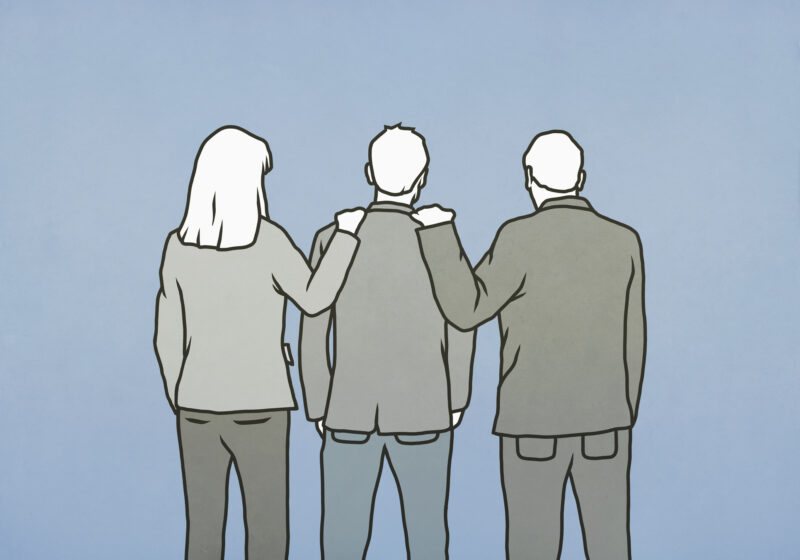Opinion
SUPER LEADER, NOT SUPERHUMAN
Raising tired arms: How boards can support their leaders during periods of crisis
In a defining moment of his leadership journey, Moshe stood away from the action. Yehoshua took the lead on the battlefront against Amalek while Moshe stood atop the mountain. When Moshe’s arms were raised, his people prevailed; when his arms were lowered, they faltered. Supporting him in this critical moment were Aharon, his brother, and Hur, his brother-in-law, helping him keep his arms aloft.
The Talmud (Taanit 11a) recounts that Moshe certainly could have found a more comfortable posture, but his discomfort was integral to his leadership. He stood on the mountaintop, not in an ivory tower. He stood away from his people, but there was no distance between them. Though we stand separate from our sisters and brothers in Eretz Yisrael, we want to keep our arms lifted, pleading for their immediate success.

Illustration by Malte Mueller/Getty Images
This evocative image resonates deeply for many heads of school; and as mentors for the Day School Leadership Training Institute (DSLTI), we have the unique vantage point of seeing the exhaustion in the arms of our school leaders. Though the war rages halfway across the world, we feel it imminently, and the exhaustion is physical, emotional and even spiritual. Many heads have taken a lead in their communities in gathering supplies, in taking in Israeli students, in chesed and in tzedakah. They have been taking on projects well beyond their usual (already heavy) scope of responsibilities. Like Moshe, we look for the Aharons and the Hurs who will help keep our arms raised, supporting those on the front lines, particularly in our moments of discomfort.
We believe that it is a board’s job to fill that role. As such, we want to propose several ways for you to be the Aharon to your Moshe, whether it is at a day school, a synagogue, a foundation or another Jewish communal institution.
1) Insist: Your head needs your support. Just as you support them in achieving their other goals for the year, support them in their self-care. Build it into their performance review, and treat it as seriously as you treat other recommendations. For instance, if you spend 45 minutes discussing strategies for them to be more present in the classroom, spend 45 minutes discussing strategies for them to be more present for themselves.
2) Concretize: Yogi Berra quipped that your chances of winning the lottery go up when you buy a ticket. The chances of a head taking care of themselves goes up when they have an actual plan. Will they go to the gym during working hours? Will they limit themselves to one nighttime meeting a week? Will they have a sabbatical written into their next contract?
3) Check in: During your weekly call, hold them accountable. If they insist they just didn’t have time, ask them what needs to be true for them to have the time. Make it clear that this is nonnegotiable.
4) Take responsibility: Be realistic in the number of scheduled meetings that the head needs to attend. Become the head’s offensive line, ensuring that the head’s self-care is seen as essential for the health of the institution. In addition, check in on the expectations that the board and the community has of the head and reflect on whether those expectations are realistic. Board chairs should ask themselves, How are we contributing to the head’s well-being, and how are we making it harder for the head to make self care a priority?
4) Repeat: This is not a one-time deal. During the COVID-19 pandemic we all saw the exhaustion. With the current crisis, we see it again. But it is persistent; it exists all the time. Call and check in regularly. Caring goes a long way. Your persistence should not seem like ”another expectation” but rather come from a place of investment in the head’s humanity.
The Midrash teaches us that not only is self-care never selfish, it is, in fact, a divine imperative. In a powerful scene, Hillel the Elder’s students ask him where he is going. “To fulfill a mitzvah,” he says. “I am going to the bathhouse.” Surprised, his students push back: Could that really be a mitzvah? Absolutely, he insists. We are, after all, created in the image of G-d. The body is G-d’s gift to us, so certainly we must care for it. (Vayikra Rabbah 34:3).
We affirm the importance of self-care for all people, not just leaders. But we know that this need is pressing for school heads and other communal leaders who are struggling. For the sake of the leader and for the sake of the field, we must do better.
Rabbi Jordan Soffer is head of school at Striar Hebrew Academy in Sharon, Mass. Jane Taubenfeld Cohen is the senior mentor for the Day School Leadership Training Institute (DSLTI) and is a mentor in the You Lead program of PRIZMAH: Center for Jewish Day Schools.












